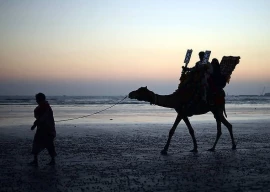
After wheat-flour and sugar crises, Pakistan is now in the grip of a gas crisis as the government has cut fuel supplies to non-export industries for one-month - a situation which carries serious implications for inflation and unemployment in the country.
“We had to curtail captive power units of general industries (non-export) from the middle of December 2020 to end of January 2021,” Sui Southern Gas Company (SSGC) informed industries through a notification issued on December 31.
The supply cut is “as per sectorial priority approved by the Cabinet Committee on Energy (CCOE) in its meeting held on November 26, 2020”, the notification stated.
This is not the first time that the industries are facing trouble due to the gas crisis as during the winter season demand for the fuel peaks in the wake of drop in temperature across the country. However, a large number of households - that are the topmost priority to receive gas supplies to fight against freezing temperature through gas-run stoves, heaters and geysers - are also complaining of long outages every day this year.
The industrialists said the gas crisis may peak during the ongoing month of January and may last until mid of February.
“Had the government worked upon setting up new gas (re-gasified liquefied natural gas/RLNG) import terminals at seaports then the situation would have been better in the country,” Korangi Association of Trade and Industry (KATI) former president Sheikh Umer Rehan said while talking to The Express Tribune.
The Pakistan Tehreek-e-Insaf formed its government in August 2018, but it is yet to act to add the much-needed RLNG import terminals in the country. The country had developed two import terminals during the tenure of former governments. They are being operated at full capacity to import 1,200 million cubic feet per day (mmcfd).
Pakistan is facing a shortfall of around 1,700mmcfd these days. The gas utility firms are supplied a cumulative 4,300mmcfd (including imported gas) compared to aggregated demand of 6,500mmcfd these days. “The local reserves of gas are depleting at 10% per year as per the gas utility firms,” Rehan said.
Thousands of industrial units have switched to alternates like furnace oil and diesel. “This has increased the cost of production and may result in price-hike of industrial goods,” he warned.
Many industries including exportable and non-export textiles, steel, fertiliser, food manufacturers and CNG fuel stations depend upon gas supplies.
“The use of alternate fuels in textile industries increases the cost of production by 3-5%,” said Lahore Chamber of Commerce and Industry (LCCI) former vice president Mian Abuzar Shad.
“Such (gas crisis) situations force industrialists to cut manpower to cope with the situation,” Karachi Chamber of Commerce and Industry (KCCI) former president Zubair Motiwala said. “We are in contact with the federal government for resolution of the gas crisis.”
All of them were of the view that the situation of non-export industries has worsened without the gas since the crisis started taking place about a month ago.
The government claims it is scheduled to receive 12 ships of imported gas (equivalent to 1,200mmcfd) during January. Local oil and gas exploration firms have failed to find meaningful gas deposits for over a decade now.
The industrialists said the government should work actively to resolve the gas crisis through policymaking in the parliament and end political scorings at public rallies and gatherings.
The notification issued by SSGC added, “SSGC (alone) is facing acute shortage of gas supplies from different fields and around 150mmcfd gas is being short supplied during this winter in comparison to the last year. The situation was brought to the notice of the federal government.”
Due to current cold wave, it has now become almost impossible to meet the requirement of domestic customers at the current supply rates, therefore, it has been decided to completely close all captive power plants of non-export general industries with immediate effect to maintain adequate supplies for the domestic sector.
Govt vows support
In response to the concerns expressed by the industrialists in Karachi on the issue of gas crises, President Dr Arif Alvi assured to this matter up to the relevant ministers.
During a meeting held with the businessmen at the Sindh Governor House, he assured the business community that he will update them within a couple of days on the causes for gas shortage and strategies that were being devised to deal with the situation, said a statement issued by the Karachi Chamber of Commerce and Industry (KCCI).
KCCI President Shariq Vohra informed the president that the ongoing gas crises in Karachi has become a serious issue, which needs to be probed because, during these times when the exports were picking up, some loop holes in the system abruptly intervened and caused gas shortage, which has resulted in the closure of factories.
He added, “We fear that if the gas crises goes on like this, it would become difficult not only for the exporters to dispatch their orders on time but also general industries will not be able to ensure smooth supply of goods in the local markets.”
[WITH ADDITIONAL INPUT FROM OUR CORRESPONDENT]
Published in The Express Tribune, January 3rd, 2021.
Like Business on Facebook, follow @TribuneBiz on Twitter to stay informed and join in the conversation.




































COMMENTS
Comments are moderated and generally will be posted if they are on-topic and not abusive.
For more information, please see our Comments FAQ